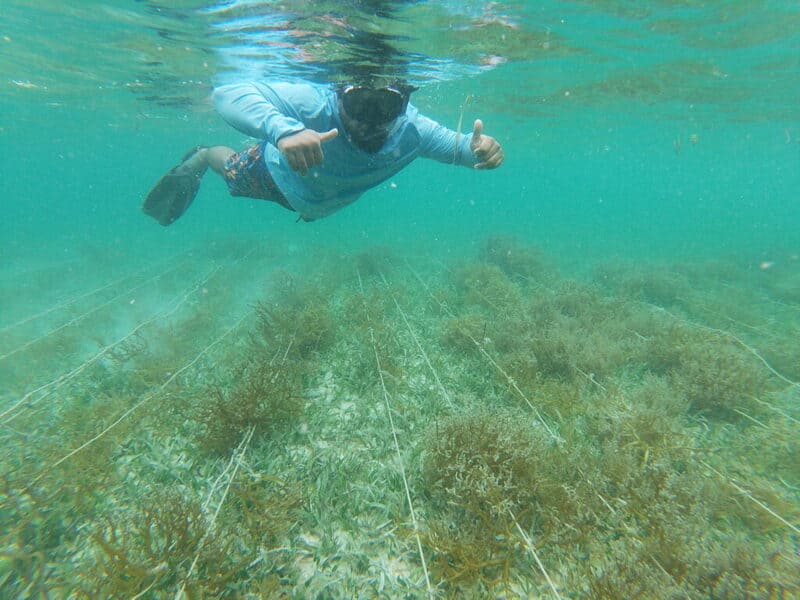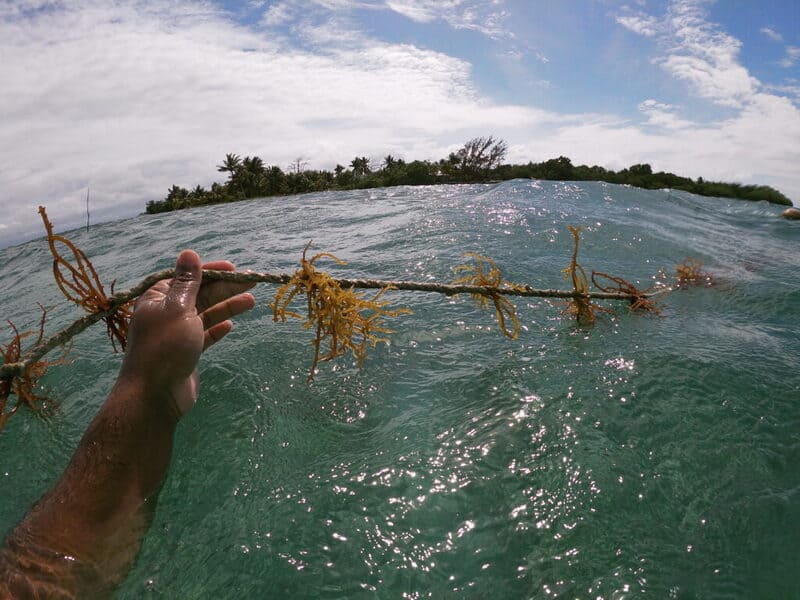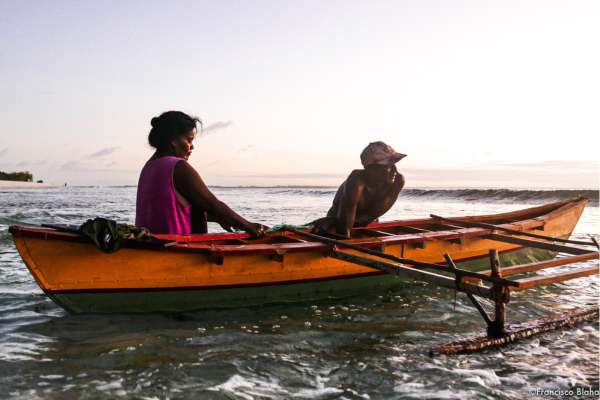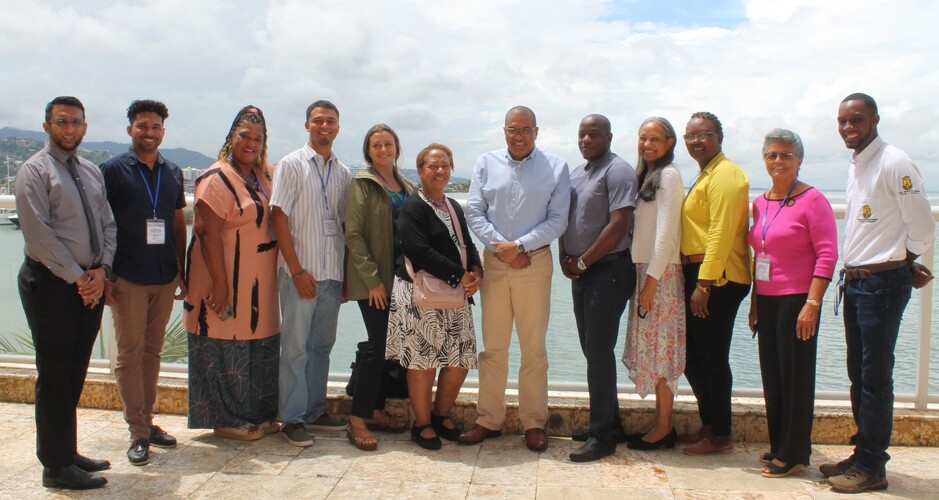
Written by:

Lucas Mira
Junior Associate
Sustainable Seaweed
Although not commonly associated with marine flora, seaweed is a complex and highly intriguing genus of plants. Boasting a wide array of distinctive morphological features such as varying shapes, sizes and colors, seaweed constitutes a diverse group of organisms that can offer a multitude of benefits and applications. It holds a critical role in the ecosystems, as a crucial source of food for many marine animals, playing a vital role in sustaining life beneath the waves.
It also offers an interesting economic opportunity for Caribbean coastal communities, given the wide range of other uses that make it an incredibly valuable resource. From cosmetics to pharmaceuticals, seaweed is a key ingredient in many products that we use every day.
As the world seeks out more sustainable sources of food and materials, seaweed farming and harvesting are becoming increasingly important industries.
The Caribbean region is home to a rich diversity of seaweed species, many of which hold significant economic and cultural value for local communities. From vibrant red algae to versatile brown and green varieties, these seaweeds play a crucial role in the region’s ecosystem and provide a multitude of benefits. The Gelidium spp., for example, is well known for their gel-forming properties; whilst Gracilaria spp. are valued for agar production; and Sargassum spp., forming expansive floating mats called “Sargassum rafts”, an important ecosystem providing shelter, food and breeding grounds to various marine species. These species showcase the rich biochemical diversity and economic and environmental significance of Caribbean seaweeds in scientific, industrial, and cultural contexts.
The rapid expansion of artisanal seaweed farming in tropical regions, driven by the increasing demand for phycocolloids from red algae, presents an opportunity to leverage the potential of Caribbean seaweed species. While the exact number of people relying on the seaweed industry in the region is yet to be determined, the importance of these marine plants cannot be understated. Traditional seamoss food products have maintained their popularity, creating a market that offers opportunities for income generation and livelihood development. Seamoss cultivation and processing can serve as additional options for individuals seeking to diversify their sources of income and support new entrants into the marine resource use sector.
In light of the Caribbean region’s expansive coastlines, optimal water temperatures, and favorable climatic conditions, it provides an exceptionally conducive environment for the cultivation of premium-grade seaweed. Embracing this burgeoning industry provides a host of multifaceted advantages, which include:
- An ideal growing condition for seaweed farming, which presents a significant opportunity for the region to become a major producer of high-quality seaweed. As a sustainable and versatile crop, seaweed can be used in a wide range of products, from food and cosmetics to pharmaceuticals and biofuels.
- Seaweed farming is an environmentally sustainable way to generate income and create jobs in coastal communities, particularly in areas where traditional fishing and farming practices may be under threat from overfishing, pollution, and other challenges.
- While sargassum can pose challenges for tourism and marine ecosystems, it also presents a valuable resource that can be harvested and processed for use in various products.
Delving into farming and harvesting, we find ourselves immersed in a world of technical and meticulous processes. Within this domain, two primary methods of cultivation, suspended culture and bottom culture, take center stage, each with its unique approach to fostering optimal seaweed growth. Complementing these methods is the indispensable role of freshwater, serving as a vital resource for seed production and ensuring the pristine quality of harvested seaweed during post-harvest handling and logistics. Moreover, seaweed harvesting, conducted with meticulous care, involves carefully gathering mature seaweed from the cultivation structures or natural habitats. This process requires skilled techniques to ensure minimal disturbance to the surrounding environment and to maintain the quality of the harvested seaweed.
However, there are also several challenges facing seaweed farming, harvesting, and production in the Caribbean; which we’ve explored in conversation with local Belizean experts, Mr. Wilbur Dubon, pioneer of seaweed projects in Belize and Maximiliano Caal, project manager of BWSFA (Belize Woman Seaweed Farming Association), a project founded by The Nature Conservancy that focuses on improving the management of seaweed farms.

These challenges underscore the urgent need for sustainable and adaptive practices to ensure the long-term viability and scalability of seaweed farming in the Region.
All things considered, despite the challenges faced by the seaweed industry in the Caribbean, there is great potential for this industry to grow and thrive. By addressing the challenges of infrastructure, climate change, invasive species, regulatory framework and commercialization, governments and communities can support the growth of a sustainable and responsible seaweed industry. As we continue to explore and appreciate the wonders of seaweed, we can also help to promote the economic, cultural, and ecological value of this amazing resource.
-
Invasive Species:
Another challenge facing seaweed farming and harvesting in the Caribbean is the presence of invasive species, such as the sargassum seaweed that has been washing up on Caribbean shores in recent years, taking along debris from all the regions. Also, invasive species can compete with native seaweed species for resources and introduce new diseases and pests. This, according to both experts consulted, poses a significant challenge for seaweed farms using floating systems just below the surface of the water. However, in their particular cases, they are both working with submerged systems placed between 1 and 2 feet from the seabed, avoiding this threat.
-
Regulatory framework:
The desire and commitment of governments to support the development of new industries, can be a big challenge for seaweed farming. This is because the seaweed industry is still relatively new and not yet widely recognized or supported by governments in the region.Without government support and adequate regulatory frameworks, it can be difficult for seaweed farmers to access funding and attract investors and buyers. Also, it may be challenging to develop sustainable practices and policies that prioritize environmental and social responsibility, which are key to the long-term success of seaweed farming in the Caribbean. In order to overcome this challenge,it is important for governments to recognize the potential of the seaweed industry and provide support to ensure its growth and success.
-
Commercialization:
Finally, Mr. Dubon, expressed that the biggest challenge, and at the same time an opportunity for seaweed farmers in Belize, is marketing their product in a way that commands a premium price. Many Caribbean countries may face logistical challenges in terms of transportation, distribution, and access to markets, which can further add to the cost of production and make it difficult to compete on price. The cost of production in Belize is not expected to decrease significantly in the next few years, so the focus needs to be on marketing and branding to differentiate their product from competitors in other countries around the world and in the Caribbean region.
This is further compounded by the rise in temperature during the dry season, which slows down seaweed growth for approximately five months of the year, making it very challenging from a business point of view.
Maximiliano Caal, project manager of BWSFA (Belize Woman Seaweed Farming Association) reflected on the effects of climate change on seaweed farming in the offshore farm they have in the coasts of Placencia, which are becoming increasingly apparent. Seaweed farmers are facing challenges due to strong winds and currents from the north that are breaking the seaweed, making it increasingly difficult to harvest. As the logistics of reaching the farm become more challenging, farmers are finding it impossible to access their crops in order to monitor and maintain them. The situation is even more dire in areas where sea level rise is causing erosion of the cays. For instance, some islands near the farm, where the project has contracted farmers to increase the frequency of monitoring and maintenance, are already experiencing significant erosion. Farmers are starting to realize that they may have to abandon these islands in the not-too-distant future.
-
Climate Change:
The Caribbean region is particularly vulnerable to the impacts of climate change, including rising sea level and temperatures, ocean acidification, and stronger storms and winds. These environmental changes can have a significant impact on the growth and quality of seaweed crops and could potentially lead to crop failures.
Mr. Dubon, for example noted that the companies are facing challenges with access to fresh water for their seaweed farming, as they farm 20 miles off the coast and there is no municipal water source in the coast. So, they are planning to create a hub in Southern Belize where farmers can bring fresh seaweed, which will be processed using FDA-approved materials to ensure a consistent standard and quality. However, the marine spatial planning process and planning of coastal infrastructure for Belize is primarily focused on tourism and may not include space for mariculture (a challenged linked to the lack of a clear regulatory framework, discussed further below).
-
Infraestructure:
One of the main challenges facing the development of a seaweed industry is the lack of infrastructure. This includes: stable electricity; transportation routes; processing and storage facilities; research centers; water quality monitoring infrastructure; waste management infrastructure; and freshwater availability.
According to Mr Dubon and Maximiliano, challenges to seaweed cultivation include:
Related posts
sign up our newsletter
ITACA Solutions is a technical services provider focused on implementing climate adaptation in coastal areas in the Caribbean. Sign up to our mailing list to receive our newsletter with updates about our work, publications, activities and events.






